Liberia Voted Off IMO Member Council

in a brief statement on LinkedIn, the Chairman of the Liberia Maritime Authority, Dr. James F. Kollie, said: ŌĆ£We fought a great fight today at the IMO but we lost. Liberia will not be on Council this biennial (2020 to 2021). However, we will put the pieces together and return for another fight. Hats off to the London team and all those who supported us.ŌĆØ
The Council is the executive organ of IMO and is responsible, under the Assembly, for supervising the work of the Organization.
Between sessions of the Assembly, the Council performs all the functions of the Assembly, except that of making recommendations to Governments on maritime safety and pollution prevention. The 40-member Council is divided into three categories ŌĆö A, B and C ŌĆö according to the magnitude of MembersŌĆÖ technical capacity
Partly helped by her status as the worldŌĆÖs second largest shipping registry, Liberia has since 2012 enjoyed its coveted erstwhile position in the CouncilŌĆÖs Category C. This category comprises 20 states with special interests in maritime transport or navigation and whose election to the Council will ensure the representation of all major geographic areas of the world. However in this yearŌĆÖs Council election, Liberia was the only country voted out of its Category and one of two countries voted out in the entire process. Liberia, being one of the five African countries on the Council (all of them in Category C), was replaced by Kuwait.
Category C Member States that were retained on the Council are Bahamas, Belgium, Chile, Cyprus, Denmark, Egypt, Indonesia, Jamaica, Kenya, Malaysia, Malta, Mexico, Morocco, Peru, the Philippines, Singapore, South Africa, Thailand and Turkey.
The only other member state voted off the Council was Sweden (Category B), replaced by Argentina. Category B comprises 10 states with the largest interest in international seaborne trade. Other states in this category include Australia, Brazil, Canada, France, Germany, India, the Netherlands, Spain and the United Arab Emirates.
The Assembly of the International Maritime Organization has elected the following States to be Members of its Council for the 2020-2021 biennium:
Category A, however, comprises 10 States with the largest interest in providing international shipping services, all of which retained their spots on the Council. They are: China, Greece, Italy, Japan, Norway, Panama, Republic of Korea, Russian Federation, United Kingdom, United States.
ŌĆśTight shipŌĆÖ
Liberia has had a seat on the IMO Council since 2012, during he administration of then President of Liberia, Ellen Johnson Sirleaf. At the time, the country was rising on a tidal wave of renewed vigor in global maritime affairs. This was due not only to the size of its shipping registry and significant increments in the registryŌĆÖs gross tonnage, but great efforts were being made to enhance ship and port safety. That, and with intense lobbying, how could the nation with the worldŌĆÖs second largest shipping registry not have a seat on the Council?
In 2012, Liberia won her seat on the 40-member Council with 112 votes. Retaining that seat for another three terms (2 years per term), Liberia earned an impressive 117 votes in 2017, securing the countryŌĆÖs reputation as an influential member of the Council.
During the period, the Liberia shipping registry reached a high of 4,400 active vessels with170 million gross tons.
Needless to say, the Liberia Maritime program ran a ŌĆśtight shipŌĆÖ until things got political back home around the middle of 2018 that led to the colossal displacement of the country in the global maritime sector.
Turbulence over Tenure
It can be recalled that since June 2018, during the infancy of the Administration of President George M. Weah the government, in its attempt to secure high-profile political appointments for some of its supporters, ran into a turbulent dispute with the countryŌĆÖs Permanent Mission of Liberia to the IMO, seated in London, UK, which the President tried to replace. The issue, which went viral on news and social media, quickly raised the presidentŌĆÖs ire against tenured positions, which the Permanent Mission to the IMO was protected by. As the President refused to relent on the issue, the matter ended up at the Supreme Court of Liberia, which mandated the Government to back off and all the Permanent Mission to function.
Similar issue ensued between the President and the Executive Director of the Liberia Extractive Industries Transparency Initiative (LEITI), in which the President ordered the Executive Director, which was a tenured position, to be changed by one of the PresidentŌĆÖs own choosing ŌĆö a violation of the LEITI mandate. Months later, when Liberia became threatened with being delisted from the global EITI community, the President was constrained to correct his mistake. |


